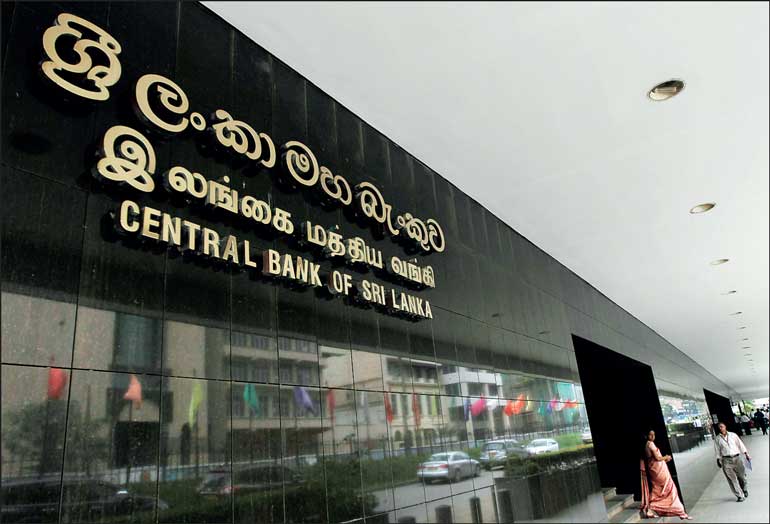Sunday Feb 15, 2026
Sunday Feb 15, 2026
Wednesday, 9 February 2022 00:00 - - {{hitsCtrl.values.hits}}

To say that the Government’s October 2021 decision to introduce a mandatory conversion of export proceeds caught the private sector by some surprise, may perhaps be an understatement. It was, admittedly, no secret that the country’s foreign exchange reserves were rapidly depleting and that by Q3 of 2021, the country was in the throes of a very serious liquidity crisis. However, Sri Lanka’s forex problems are structural and longstanding, and the latest iteration of issues had commenced as early as Q2 of 2020, around the same time the economy (particularly the key foreign income drivers such as tourism and exports) started feeling the impact of the pandemic1.
admittedly, no secret that the country’s foreign exchange reserves were rapidly depleting and that by Q3 of 2021, the country was in the throes of a very serious liquidity crisis. However, Sri Lanka’s forex problems are structural and longstanding, and the latest iteration of issues had commenced as early as Q2 of 2020, around the same time the economy (particularly the key foreign income drivers such as tourism and exports) started feeling the impact of the pandemic1.
While various restrictions and limitations on outward remittances for capital transactions and imports were immediately imposed, merchandise exporters could be forgiven for having thought that they were insulated from hard impact, as it was only in around February 2021 that the Government started targeting export proceeds to bolster reserves (through rules introduced under the Monetary Law Act); in fact, upon lobbying, the Government even quickly reduced the initial 25% conversion requirement to a much more temperate 10% as well2. The introduction of the ‘Repatriation of Export Proceeds into Sri Lanka Rules No. 5 of 2021’ (the ‘Export Proceeds Conversion Rules’) by gazette notification on 28 October 2021, requiring all exporters (whether of goods or services) to repatriate and convert 100% of their export earnings (save for certain limited qualifying payments), can therefore be perceived as a reactive (or ‘knee-jerk’) policy decision to a growing and unmanageable forex ‘crisis’ than a carefully considered and designed administrative scheme.
This article is however not intended to provide general commentary on the merits and demerits of the Export Proceeds Conversion Rules; the sobering reality is that the rules have been in force for around three months now and will likely continue for a while longer. Instead, it seeks to discuss certain misconceptions, misstatements and misinterpretations that can and should be urgently addressed by the Monetary Board and the Central Bank, in the wider interest of fairly facilitating and supporting trade and industry within the intended regulatory framework.
1) It is incorrect to state that all payments to ‘local suppliers’ must be made in Sri Lankan Rupees, due to the provisions of the Monetary Law Act.
This is a narrative that is being presently promoted by the government and to that end, has also been even included in the ‘Frequently Asked Questions (FAQs)’ document published by the Central Bank in relation to the Export Proceeds Conversion Rules3 (“CBSL FAQs Document”).
It is also disingenuous and misleading.
The Monetary Law Act specifies inter alia that the Sri Lankan Rupee is to be the ‘default currency’ for the settlement of monetary obligations, in the absence of a legally valid and enforceable agreement to the contrary (section 4). The Foreign Exchange Act No. 12 of 2017 (“FEA”) (arguably the primary law governing foreign exchange transactions in Sri Lanka) however expressly permits persons who hold foreign exchange in a bank account in Sri Lanka to utilise such funds for the making of domestic payments as well4.
In fact, regulations had been issued in 2017 by the Central Bank’s Department of Foreign Exchange (“DFE”) enabling the opening of foreign currency bank accounts by residents (known as ‘Personal Foreign Currency Accounts (PFCAs)’ and ‘Business Foreign Currency Accounts (BFCAs)’) and the transfer of funds between such accounts, irrespective of the account holder. While restrictions were imposed on such transfers from PFCAs in early 2021, the right of BFCA holders (i.e., businesses) to use funds for forex payments to other BFCA holders, for the supply of both goods and services, continued under directions issued by the DFE.
Restrictions on these forms of payments have now been imposed via the Export Proceeds Conversion Rules but this is a temporary situation necessitated by the severe balance of payment and forex liquidity issues and should be characterised and understood as such. In fact, the rules have been gazetted under provisions of the Monetary Law Act that specifically empower the Monetary Board to take remedial action to deal with such exceptional circumstances.
2) Permitted foreign currency [current transaction] payments to local suppliers are not only limited to the procurement of ‘raw materials’.
Section 4(iv) of the Export Proceeds Conversion Rules sets out the five categories of ‘authorised payments’ for which export earnings can be utilised, before the remainder is mandatorily converted into Sri Lankan Rupees.
One such category is the “payments for purchases of goods and obtaining services by the exporter of goods and services, related to such export of goods and services including one-month commitments in foreign currency, thereof”. From a legal perspective, this can be reasonably interpreted to mean that domestic payments for any goods or services can be made in foreign currency (i.e., from and out of the export proceeds) insofar as they ‘relate’ to the export activity (and such a nexus can be direct or indirect). It is also a commercially sensible approach, for an exporting entity should be able to use its foreign currency funds for any procurement of goods or services that relate to its export activities that cannot [efficiently] be procured in LKR.
For example, if an export-oriented apparel manufacturer needs to purchase some machinery and equipment for its business, and such purchase needs to be made through a local agent/distributor (perhaps due to the existing commercial arrangements between the equipment manufacturer and the agent), the apparel manufacturer should be able to make the necessary payment in foreign currency to the local agent/distributor who would then be able to make the outward remittance to the manufacturer to import the necessary equipment (and in terms of services, even pay for any foreign technicians, etc., for installation or training purposes); any other forced arrangement creates complexities, delays and costs (i.e., with the agent/distributor lining up with other general importers to acquire the foreign currency from the banks to make the necessary imports at the markedly higher ‘sell rate’ and with likely delays, or the apparel manufacturer being compelled to engage in equipment importation activities directly).
The CBSL FAQs Document however proclaims, in the answer to question 11, that payments to local suppliers can only be for the supply of “raw materials…used…for the final export”.
The CBSL FAQs Document is not law, and the Central Bank does not have the authority to unilaterally impose restrictions on the provisions of the Export Proceeds Conversion Rules through such administrative guidelines. In fact, the CBSL’s approach results in a clear disregard for the authorisation regarding payments for all export activity related goods (i.e., and not just ‘raw materials’), as well as the express reference to payments for services.
As some banks appear to be relying on the provisions of the CBSL FAQs Documents when deciding whether to permit any particular payments, it is imperative that the CBSL rectifies these errors at the earliest opportunity. A determination as to whether a particular goods or services payment is ‘related’ to an entity’s export activities is a value judgment that should be made by the exporter’s bank as the ‘Authorised Dealer’ (similar to outward remittances for current transactions). For guidance purposes, however, the Central Bank can publish an indicative/non-exhaustive list of transactions that would ordinarily amount to authorised payments for the purposes of section 4(iv) of the rules.
3) Requiring service exporters to repatriate the export proceeds within 180 days from the date the relevant services are provided is commercially impractical.
The Export Proceeds Conversion Rules require every exporter of services to mandatorily receive in Sri Lanka all export proceeds within 180 days from the date the relevant services are provided. This means that the 180-day clock starts running as soon as the provision of the services is completed and not from the date of invoicing.
This is commercially impractical and unduly restrictive. The supply of services cannot be equated with merchandise exports, as the general market practice in relation to the latter may be that invoicing occurs around or prior to the time of shipment; for services, however, the terms of engagement may vary greatly based on the supplier (or the client/customer) and the nature of the services to be provided. Invoicing may not necessarily occur immediately after the service provider’s specific responsibilities are fulfilled; in fact, for professional services, local service providers (lawyers, accountants, tax advisers, strategy consultants, etc.) who are assisting on cross-border or multi-jurisdictional matters may be contractually compelled to invoice only after the completion of certain milestones, or the entire transaction. To unnecessarily interfere in such arms-length contractual arrangements through regulatory measures may adversely affect the competitiveness of domestic service providers.
The Central Bank should therefore amend the rules to specify that, in respect of exporters of services, the 180-day repatriation period commences from the relevant date of invoicing.
Footnotes:
1For a good early analysis, see: https://economictimes.indiatimes.com/news/international/world-news/sri-lanka-faces-worst-decline-as-debt-crisis-looms/articleshow/79744383.cms
2https://www.ft.lk/top-story/Exporters-decry-CB-order-to-convert-25-forex-earnings/26-713543/ http://www.colombopage.com/archive_21A/Apr16_1618582892CH.php
3https://www.cbsl.gov.lk/sites/default/files/cbslweb_documents/press/notices/notice_20211124_faq_on_repatriation_of_export_proceeds_e.pdf
4Even if there was a conflict between the provisions of the FEA and the Monetary Law Act in this regard, principles of statutory interpretation would dictate that the later law (i.e., the FEA) takes precedence.
(The writer is an Attorney-at-Law and head of the Corporate and Commercial Law Department at Sudath Perera Associates. The views expressed here are his own.)